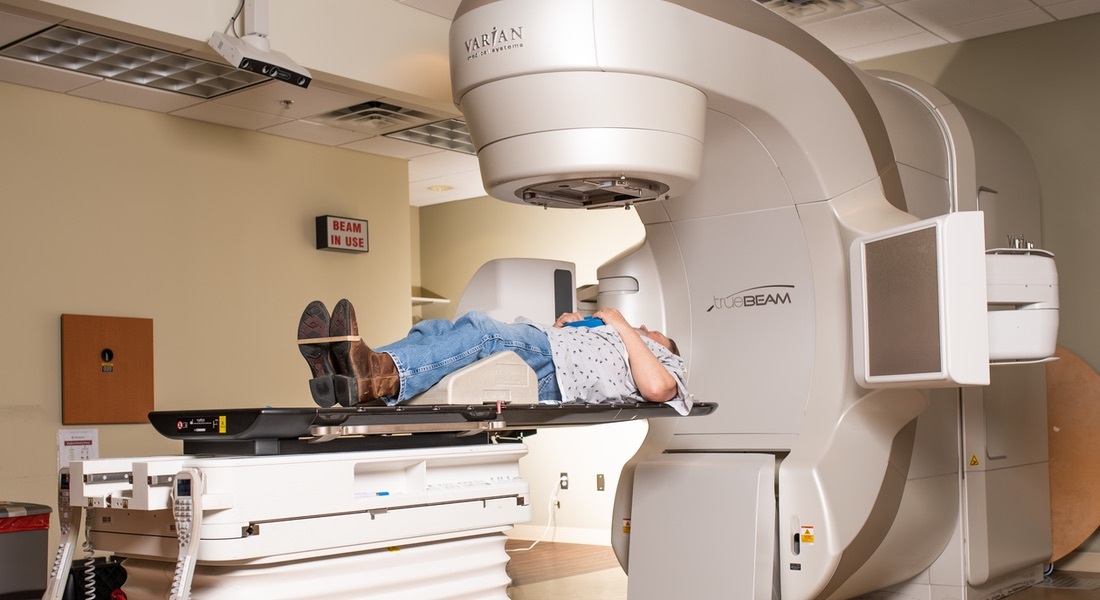
Radiation therapy is one of several types of treatment often used to treat cancers of the colon and rectum, collectively referred to as colorectal cancer. The radiation oncologist will consult with the surgeon and the medical oncologist who would administer chemotherapy, immunotherapy and/or targeted therapies to determine the right time for radiation treatments.
Chemotherapy: the use of drugs to stop the growth of cancer cells, either by killing the cells or by stopping them from dividing. If chemotherapy will be part of your treatment it will usually be 2-4 weeks following surgery before treatment begins.
Targeted therapy: the use of drugs or other substances to identify and attack specific cancer cells. Some targeted therapies work better than others based upon the patient’s biomarker testing results. Targeted therapies focus on specific proteins in cancer cells that control how the cells grow.
Immunotherapy: uses the patient's immune system to fight cancer. Substances made by the body or made in a laboratory are used to boost, direct, or restore the body's natural defenses against cancer. This cancer treatment is a type of biologic therapy.
Surgery is often required as part of colon or rectal cancer treatments, but not for everyone depending on where it’s located and how far it had grown at the time it was found.
For patients who will have surgery, radiation therapy and/or chemotherapy are sometimes given beforehand to shrink the tumor for easier removal. For patients who may not be a candidate for surgery, a chemo and radiation combination may be the best option for treatment.
Patients also receive radiation therapy after surgery to remove colorectal cancer. This might be necessary to be sure that all of the cancer cells have been killed that may have been left behind during surgery. Radiation therapy after surgery is also used to treat colorectal cancer cells that have attached to an internal organ or the lining of the abdomen.
You may not need radiation therapy before and after surgery. This will be up to your cancer care team to decide as they look at scans and test results.

The most commonly used type of radiation therapy for colorectal cancer is external beam radiation therapy. This uses high-intensity beams of radiation, directed at a very specific area of the body, such as the colon or rectum, to kill cancer cells and shrink tumors.
With external beam radiation, the radiation comes from an x-ray machine called a linear accelerator. To begin the treatment process, you will go through a planning session called a CT simulation. The CT images are used to identify areas where treatment is needed and also areas that need to be protected. After the simulation session, daily treatments will begin.
During treatment, you will lie down so radiation can be applied to the pelvis from multiple directions. Each round of treatment is given five days a week for about 4 to 6 weeks. Progress on the shrinking of the tumor will be checked after each round of radiation therapy.
Before undergoing radiation therapy, talk with your radiation oncologist about what to expect, including the possible short and long-term side effects. Side effects of radiation therapy will depend on factors such as the total dose of radiation and if chemotherapy is given at the same time (chemoradiation).
Possible side effects of radiation therapy for colorectal cancer can include:
Skin irritation, such as redness, blistering, or peeling at the radiation site
Rectal irritation, which can cause diarrhea, blood in the stool, or painful bowel movements
Fatigue
Bowel incontinence (stool leakage)
Urinary and bladder changes
Sexual problems (erection issues in men and vaginal irritation in women)
Most side effects go away on their own after treatment is over, but some side effects may last a long time or become permanent. Talk to your oncologist or radiation therapist right away if you notice any side effects so steps can be taken to reduce or relieve them.
Remember that you have a choice when it comes to where you receive your radiation therapy. With our cancer centers located in the greater Atlanta area you won’t need to go into a hospital for treatment or deal with hospital parking for outpatient procedures. Find the location that’s closest to you and request an appointment for an initial consultation.
Quickly and efficiently build the materials you need to support your inbound marketing strategy. Drag and drop building blocks including testimonials, forms, calls-to-action, and more.